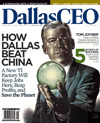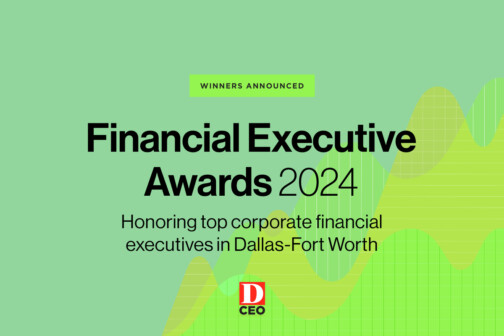You’re asking yourself: Do I really need another magazine? No, you don’t. I’m not naïve. I know your inbox is already full.
So let me tell you why I started this magazine and why I hope that even if you don’t think right now that you need it, after a few issues you’ll start to look forward to it.
In 2004, EDS formed an alliance with such industry giants as Microsoft, Oracle, and Dell. The alliance publishes a magazine called synnovation, and in its first issue, Jeff Wacker of EDS wrote that in a few years business will either be local or global. Companies that are now regional or national will go international or lose their footing. We see the phenomenon every day in Dallas. Even our law firms are going global (see where the partners of Thompson & Knight, Dallas’ oldest law firm, are now situated on p. 14).
This trend creates a centrifugal force, pulling the attention of our best people outward. The typical global, national, or regional company in Dallas does only 3 to 6 percent of its sales here. Some of our biggest multinationals—Hunt Oil, for example—do none. Only one company in Dallas-Fort Worth with sales of over a half billion—Minyards—gets most of its revenues from Dallas.
This puts the typical CEO in the awkward situation of living here, working here (when not on airplanes), raising children here, going to church here, but otherwise having very little to do with the city he calls home.
Not only is this bad for the city, but, as it turns out, it is something company leaders themselves don’t like. We met with scores of CEOs while planning this magazine, and their biggest complaint was a feeling of being disconnected, a loss of the sense of place. They wanted to know how the local economy is doing. They wanted to know about the new ideas and innovations percolating around town. Most of all, they wanted to know about each other.
Our purpose in starting this magazine is to create a centripetal force to counter the centrifugal force that is the inevitable fact of doing business today. We want to pull—even if for a few minutes—our readers’ attention back to business—and leisure—in Dallas. In doing so, we admit to a second agenda.
Dallas is a business city. It was founded as a trading post and has become the nation’s most important distribution center. For decades, it grew because business leaders wanted it to grow. Banker R. L. Thornton put the case bluntly to his fellow bankers in the 1930s: “Instead of fighting over who gets the bigger slice of a small pie, let’s work together to make the pie bigger.”
Those days are gone. Business owners built this city as a way to build their businesses. Today’s CEOs can’t act like those owners because they aren’t owners. But their talent, their intelligence, their worldview, and their salesmanship are the biggest assets this city has. In recent years, the disconnect businesspeople feel is also felt at City Hall. The people who run the city often have little contact with the people who provide the jobs and the investments that make the city run. By drawing the attention of business leaders back to the city they call home, we hope to reconnect them with the civic enterprise.
Maybe that’s asking too much of a little, 48-page magazine. On the other hand, maybe it’s not asking enough.
We’re from Dallas. We’ve found that nobody ever died from thinking big.





